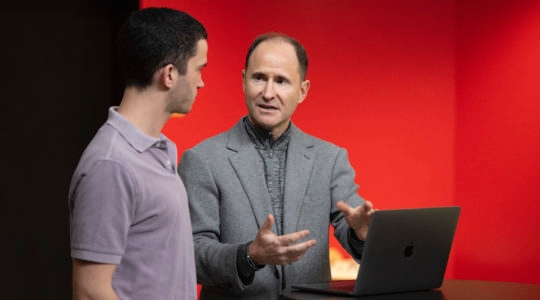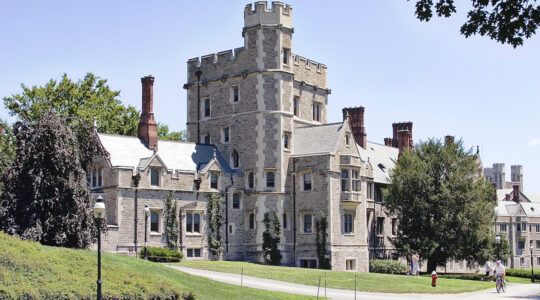WASHINGTON (JTA) — In a Los Angeles courtroom, the federal justice system is colliding with one of the most vexing areas of Jewish law.
Rabbi Moshe Zigelman, 64, already has spent two years in jail in a tax-fraud and money-laundering case that also saw the grand rabbi of the Spinka Chasidic sect sent to prison. The scheme involved soliciting large tax-deductible donations and secretly funneling most of the money back to the donors.
Now federal prosecutors are threatening more jail time for Zigelman, the Spinka rebbe’s personal secretary, who is refusing to testify and implicate others before a grand jury.
Zigelman’s lawyers say that his religious convictions do not allow him to testify. They point to the laws of mesira, the Talmudic prohibition against a Jew informing on another Jew to non-Jewish authorities. In modern terms, it’s a sort of Jewish no-snitching rule.
The concept of mesira, which literally means “delivery,” dates back to periods when governments often were hostile to Jews and delivering a Jew to the authorities could lead to an injustice and even death.
The rules of mesira still carry force within the Orthodox world, owing both to the inviolability of the concept’s Talmudic origins and the insular nature of many Orthodox communities. But they are also the subject of debate over whether the prohibition applies in a modern democracy that prides itself on due process and civil rights.
“The question of the parameters of the prohibition of mesira remains a dispute about how to apply it in a just democracy,” said Rabbi Michael Broyde, a law professor at Emory University.
Rabbinical authorities are split on the issue, depending in large part on where they sit on the Orthodox spectrum. The issue is so sensitive that some religious leaders are reluctant to publicly discuss it, with many recognizing that the topic has the potential to adversely affect the way Jews are perceived.
Modern Orthodox authorities tend to advise against invoking mesira in the United States, excepting cases where there is a rare consensus that an alleged offender has been singled out for being Jewish by an anti-Semitic individual in a position of authority.
“Mesira is not applicable in a society where there is no official anti-Semitism and a reasonably uncorrupt court system,” said Rabbi Yosef Blau, the spiritual adviser at the Yeshiva University-affiliated Rabbi Isaac Elchanan Theological Seminary.
Chasidic and other haredi Orthodox authorities, however, tend to view the laws of mesira as still relevant in the American context. But they do see exceptions in which it is permissible to turn a fellow Jew over to secular authorities — for instance in cases of “din rodef,” justice for the pursuer, when the alleged wrongdoer threatens a life. In recent years, some rabbinical authorities have said that the ban on informing does not apply to alleged child molesters.
“There are certainly cases, like where a Jew is a threat to others, where it does not apply, but mesira is a religious law of great gravity and an observant Jew takes such things very seriously,” said Rabbi Avi Shafran, director of public affairs for Agudath Israel of America, a haredi Orthodox umbrella body.
Shafran, who responded to questions from JTA via e-mail, said that mesira’s role in modern America was a matter of disagreement among decisors of Jewish law. But he also noted that the late Rabbi Moshe Feinstein, widely regarded as the pre-eminent Orthodox decisor in recent times, had ruled that the ban was still in force.
Asked how the practice appears to the outside world, Shafran replied, "All Jews are family. If that fact provides grist for the mills of anti-Semites, that’s unfortunate. But it’s a fact all the same. And Orthodox Jews make no apologies for what the Torah teaches us."
Shafran cast the issue as a matter of conscience.
“In America, there is a long and illustrious history of citizens putting personal conscience before the law of the land,” Shafran wrote. “That’s part of why Americans celebrate the civil rights movement and the civil disobedience that was part of the lives of its champions. Dedication to a religious ideal deserves no less respect than dedication to a secular ideal. If a person is willing to give up his freedom in the service of a higher ideal, he should be respected for that selfless choice."
Blau said the comparison to civil rights leaders does not stand up, citing Zigelman’s case as an example.
“The people in the civil rights movement were willing to pay their price, to be put in jail,” he said. “They were fighting for justice; he is fighting for protecting criminals.”
Michael Proctor, Zigelman’s lawyer, has said in court papers that imprisoning Zigelman would be unjust because he will not “abandon his religious precepts” under any circumstances, The Los Angeles Times reported.
U.S. District Court Judge Margaret Morrow heard arguments in the case on Sept. 7 and said she would rule at a later date.
The American courts have never upheld a request for an exemption from testifying based on the rules of mesira, said Rabbi J. David Bleich, a professor of Talmud at Yeshiva University and a law professor at its affiliated Cardozo School of Law.
“I don’t know what he thinks he’s accomplishing,” Bleich said of Zigelman. “The attorney is probably trying to keep him from testifying, and it’s not going to work.”
Bleich said that as a matter of Jewish law, mesira in a democracy would not apply in civil cases. For instance, were Zigelman’s alleged co-conspirators facing a fine, he would be obliged to testify.
A criminal matter was different, Bleich said, because there were differences among Jewish decisors over whether the state had the right to apply physical punishment, including incarceration.
“In Jewish law, it hinges on whether the secular state has a right to put people in prison,” he said.
Particularly in cases in which a defendant faces physical danger, an informant would be prohibited from testifying, Bleich said. Such dangers may face the Orthodox in maximum-security prisons, where hardcore racist gangs may hold sway, he said, but not in white-collar prisons where tax offenders serve their sentences.
Orthodox Jews must weigh not only their obligations to the state but to the community in which they live, said Broyde, who in addition to teaching at Emory is a rabbinic judge on the Beth Din of America.
“It’s a balance of what needs to be done and the community you want to be part of,” Broyde said. “It’s balancing the goal of being a good insider with being a good outsider.”
That’s not such an unusual balancing act, Broyde said, noting that it applied to other communities as well. His example: A churchgoer who reported every building code violation at his church would likely face eventual ostracism and would not have been obliged, under the law, to report the violations.
In instances in which the government requires reporting a crime — for instance, when child-care professionals uncover evidence of abuse — there is no question that an Orthodox Jew should cooperate with authorities, he said.
“One situation is when the government mandates that you report, and the other situation is where the government mandates nothing,” he said. “When the government mandates that you report, everyone agrees a Jew should report.”
JTA has documented Jewish history in real-time for over a century. Keep our journalism strong by joining us in supporting independent, award-winning reporting.





